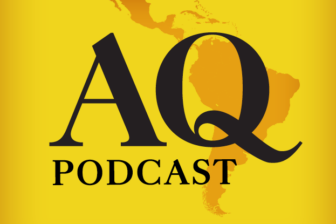El Salvador’s new congress took office on May 1 and immediately voted to remove the Attorney General Raúl Melara and five members of the Supreme Court’s Constitutional Chamber — and replace them with allies of President Nayib Bukele. The first act of the president’s supermajority in the legislative was described by news outlet El Faro as an effort “to remove the last institutional checks on the president’s power.”
The Constitutional Chamber, as well as critics and journalists, described the move as illegal for not following procedures laid out in the constitution. Some called it a technical coup d’état. U.S. Vice President Kamala Harris expressed “deep concerns about El Salvador’s democracy” and Secretary of State Anthony Blinken called Bukele to do the same. In Brazil, President Jair Bolsonaro’s congressman son Eduardo showed his support on Twitter.
AQ asked several observers to share their reaction to the events.
Leonor Arteaga, Senior Program Officer, Due Process of Law Foundation:
“These events enable the president’s dictatorial impulses, endangering El Salvador’s fragile democracy and undermining the system of checks and balances. They also demonstrate that Bukele’s party, Nuevas Ideas, with smaller political parties as allies, could easily use a supermajority to push for controversial moves like the removal of presidential term limits.
The moves that took place on Saturday night generated concern within the Biden Administration, but Bukele seems to disregard these international call-outs, as tensions rise with U.S. Democrats. Despite this, the U.S. is an undeniable powerful influence, and this should be leveraged to aid El Salvador in a holistic and sustained way. If hardline measures, such as sanctions were to be implemented, they should be bipartisan and exceptional in their use, taking into consideration not to worsen the poverty that so many Salvadorans already live in.
At the same time, the Organization of American States (OAS) should push Bukele to respect the rule of law and to consider whether his pattern of disregard for the court constitutes grounds to invoke the Democratic Charter. Even though OAS Secretary General Luis Almagro quickly questioned these events, the OAS’ role raises further questions because, in the past, Almagro has shown to be very supportive of Bukele and a harsher stance is yet to be seen.”
Juan Pappier, Senior Americas researcher, Human Rights Watch:
“As Bukele dismantles all the internal checks and balances on his power, international pressure and scrutiny are critical to protect rights and put his assault on the rule of law to an end. Democratic governments in the region should urgently invoke the OAS Democratic Charter and seek a collective condemnation. The charter allows any of its members states – or the Secretary General – to convene the region’s ambassadors when there is an ‘unconstitutional alteration of the constitutional regime that seriously impairs the democratic order.’ No reasonable observer can deny that threshold was met last Saturday in El Salvador.
Bukele’s move is also a provocation – and a critical test for the Biden administration. Tens of thousands of Salvadorans flee to the United States every year, and the Biden administration has an understandable interest in engaging with the government and supporting development projects in El Salvador to limit the flow. At the same time, failing to stop this move towards autocracy can have catastrophic effects in El Salvador – and beyond. Fragile institutions and lack of judicial independence are one of the main factors driving Mexicans and Central Americans to the United States. Judicial independence is also at serious risk in Mexico, Guatemala and Honduras, and non-existent in Nicaragua, and a failure to act promptly on El Salvador may be perceived by authorities in these countries as a green light to continue their ongoing attacks on the courts. So far, the Biden administration – including Secretary of State Blinken and Vice President Harris — have condemned Bukele’s move toward autocracy in strong terms. They should also show they are able to act – and put this attack on democracy to an end.”
Claudia Umaña, Vice President, Salvadoran Foundation for Economic and Social Development:
“The removal of the attorney general and supreme court justices took place under a legal facade and with the consent of the national police – but it broke with the constitutional order. It was an attack on the separation of powers, which is necessary to protect our republic. All of this helps the president achieve his absolute objective: the accumulation of power.
The events of May 1 come as institutions have already been gravely weakened. The Access to Information Institute, for example, has lost independence and efficacy in recent months. Looking forward, we can expect fewer checks on the government.
There is also real concern that the events of May 1 put ongoing negotiations with the IMF at risk, and national bond prices have fallen as of May 3. The budget deficit is already close to $2 billion, and the president’s large majority in Congress could also allow the government to easily approve more expensive, less predictable international loans.
This is all very worrying, and the coming days will be crucial in order to ensure institutions are upheld and led by officials who were elected the right way.”








